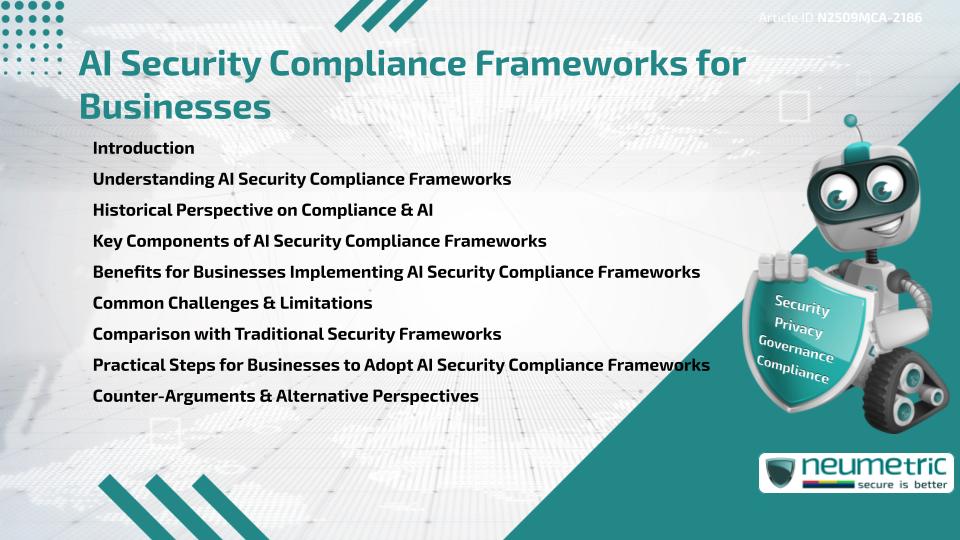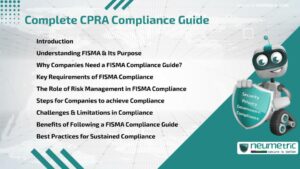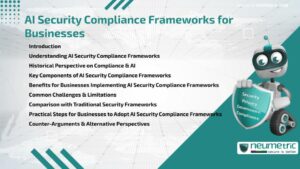Table of Contents
ToggleIntroduction
AI Security Compliance Frameworks are structured guidelines that help businesses use Artificial Intelligence in a safe, responsible & legally compliant manner. They combine principles of Cybersecurity, Data Protection & Regulatory Standards to ensure AI Systems do not expose Organisations to Risks such as Data Breaches, Bias or Misuse. For businesses, adopting AI Security Compliance Frameworks is essential to meet Global Regulations, protect Customer Trust & reduce operational Vulnerabilities. These frameworks act as a roadmap for implementing safeguards, monitoring system Integrity & maintaining Accountability across AI-driven Processes.
Understanding AI Security Compliance Frameworks
At their core, AI Security Compliance Frameworks set standards for how businesses should handle Data, design AI Models & manage system operations. They often include requirements for Encryption, Access Control, Continuous Monitoring & Audit Trails. Similar to how Building Codes ensure safety in construction, these frameworks provide structured rules to secure AI Systems & minimise Risks.
Historical Perspective on Compliance & AI
Compliance in business is not new. Regulations around Financial Reporting, Workplace Safety & Data Protection have existed for decades. With the rise of Digital Transformation, frameworks like General Data Protection Regulation [GDPR] & Health Insurance Portability & Accountability Act [HIPAA] reshaped how Organisations manage Sensitive Data. AI added new dimensions of Risk, including Algorithmic Bias & Automated Decision-Making. As a result, AI Security Compliance Frameworks emerged as an evolution of these older compliance systems, tailored to address the specific complexities of AI.
Key Components of AI Security Compliance Frameworks
Most AI Security Compliance Frameworks include several core elements:
- Data Protection: Ensuring Personal & Sensitive Information is collected, stored & processed securely.
- Model Governance: Establishing Accountability for AI Model design, training & deployment.
- Bias Mitigation: Implementing checks to identify & reduce Bias in Algorithms.
- Auditability: Keeping transparent records of AI decisions & processes.
- Incident Response: Preparing strategies to address Breaches or Failures.
These components collectively provide a structure to secure AI Systems while maintaining ethical & legal responsibilities.
Benefits for Businesses Implementing AI Security Compliance Frameworks
Businesses that adopt AI Security Compliance Frameworks gain multiple advantages:
- Risk Reduction: Lower exposure to legal & Financial penalties.
- Reputation Protection: Building Trust with Customers by showing a commitment to secure & fair AI Practices.
- Operational Efficiency: Streamlining processes through standardised Controls.
- Global Readiness: Ensuring compliance with International Standards across different jurisdictions.
These benefits are comparable to Seatbelts in cars: not only do they protect in case of accidents, but they also build consumer confidence in the safety of the system.
Common Challenges & Limitations
Despite the advantages, businesses face difficulties when adopting AI Security Compliance Frameworks. These challenges include:
- High implementation costs.
- Lack of skilled professionals trained in both AI & Compliance.
- Rapidly evolving Regulations that make long-term Compliance difficult.
- Balancing Security with Innovation speed.
These limitations highlight the need for continuous Education & investment in Compliance expertise.
Comparison with Traditional Security Frameworks
Traditional Cybersecurity Frameworks like ISO 27001 or SOC 2 focus on Data Protection & System Security but do not fully address unique AI concerns such as Bias, Explainability & Model Drift. AI Security Compliance Frameworks fill this gap by expanding traditional rules to account for Algorithmic Transparency & Fairness. While they build on the foundation of older frameworks, they introduce a layer of oversight specific to Artificial Intelligence.
Practical Steps for Businesses to Adopt AI Security Compliance Frameworks
Businesses looking to implement AI Security Compliance Frameworks can follow these practical steps:
- Assessment: Conduct a Risk Assessment to understand where AI is being used & what Risks exist.
- Policy Development: Draft internal Policies aligned with recognised AI Frameworks.
- Training: Educate Employees about AI Risks & Compliance practices.
- Technology Integration: Implement Tools for Monitoring, Auditing & Securing AI Systems.
- Ongoing Review: Regularly update Compliance measures to reflect changes in Regulations & business processes.
Counter-Arguments & Alternative Perspectives
Some experts argue that AI Security Compliance Frameworks can slow down Innovation by adding bureaucratic hurdles. Others suggest that existing Cybersecurity Frameworks may be sufficient if properly adapted. While these views highlight potential drawbacks, the consensus remains that dedicated AI-specific Compliance structures provide more comprehensive protection against Risks unique to Artificial Intelligence.
Conclusion
AI is a powerful tool, but without structured Compliance, it can expose businesses to significant Risks. Ai security compliance frameworks serve as a safeguard, offering clear standards for Security, Transparency & Accountability.
Takeaways
- Ai security compliance frameworks combine Cybersecurity, Data Protection & Legal Standards.
- They evolved from Traditional Compliance Systems but address AI-specific Risks.
- Businesses benefit through reduced Risks, better reputation & operational efficiency.
- Implementation requires investment, training & ongoing review.
FAQ
What are AI Security Compliance Frameworks?
They are structured guidelines that ensure businesses use AI Systems responsibly, securely & in line with Regulations.
Why are AI Security Compliance Frameworks important for businesses?
They help reduce legal Risks, protect Data, build Trust & ensure Ethical use of Artificial Intelligence.
How do AI Security Compliance Frameworks differ from traditional frameworks?
Traditional frameworks focus mainly on Data & System Security, while AI-specific frameworks also cover Bias, Transparency & Model Governance.
What challenges do businesses face when adopting AI Security Compliance Frameworks?
Key challenges include high costs, lack of skilled staff & keeping up with rapidly changing Regulations.
Can Small Businesses implement AI Security Compliance Frameworks?
Yes, but they may need to start with simplified frameworks or external guidance due to resource constraints.
Do AI Security Compliance Frameworks affect innovation?
Some argue they slow Innovation, but they also create a safer & more trusted environment for AI adoption.
What industries benefit most from AI Security Compliance Frameworks?
Industries handling Sensitive Data such as Healthcare, Finance & Retail benefit significantly from these frameworks.
Need help for Security, Privacy, Governance & VAPT?
Neumetric provides organisations the necessary help to achieve their Cybersecurity, Compliance, Governance, Privacy, Certifications & Pentesting needs.
Organisations & Businesses, specifically those which provide SaaS & AI Solutions in the Fintech, BFSI & other regulated sectors, usually need a Cybersecurity Partner for meeting & maintaining the ongoing Security & Privacy needs & requirements of their Enterprise Clients & Privacy conscious Customers.
SOC 2, ISO 27001, ISO 42001, NIST, HIPAA, HECVAT, EU GDPR are some of the Frameworks that are served by Fusion – a SaaS, multimodular, multitenant, centralised, automated, Cybersecurity & Compliance Management system.
Neumetric also provides Expert Services for technical security which covers VAPT for Web Applications, APIs, iOS & Android Mobile Apps, Security Testing for AWS & other Cloud Environments & Cloud Infrastructure & other similar scopes.
Reach out to us by Email or filling out the Contact Form…





